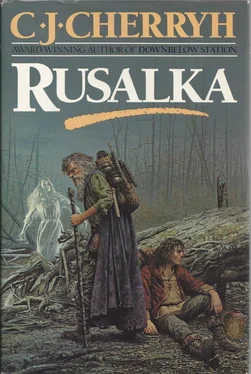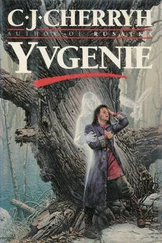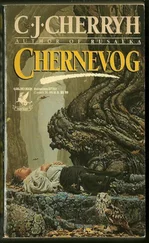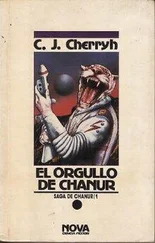“Listen, I’d patch a man up if he was bleeding on my floor, boy, and I’m not an honest man. What did it cost him? No more work than you’ve given. We’re even. That’s all. We’re quit.”
“He’s a wizard!” Sasha said. “Pyetr, you were dying, and he pulled you back—”
“Horsefeathers! I was tired, I was cold, I needed a bed and a meal—”
“You don’t remember! I watched him do it! Look at you. You’re sweating, you’re white as a ghost, you couldn’t have gone on another day.”
“You watched a good show, boy, it was already scabbed over, I wasn’t dying, I’m not dying this morning and I have no plans to be staying here any longer than takes me to get my wind back.”
He said that. He was hardly able to go on standing.
“Get out of the wind,” Sasha said. It sounded too much like an order, but he was not dealing with a sane man this morning. He tried to soften it. “Please, Pyetr Illitch. Please be patient, please just get well and do what he asks for a few days and don’t go off and leave me here…”
Pyetr was shivering now, his teeth chattering. The cold was getting too much for him, and the shirt was hardly more than a rag. “I won’t leave you here,” he said. “Damn if I will. Don’t promise the old goat anything. Don’t let him bully you. If he makes threats, tell me.”
“I promise,” Sasha said. He would have said anything to silence argument and get Pyetr inside and get another cup of hot tea into him.
There were things Pyetr would understand and there were things Pyetr would refuse to understand—or to believe in, until it was too late.
Maybe he was a fool, Sasha thought; and maybe Pyetr was entirely right; but if he had ever had a danger-feeling about a thing it was this place and this man.
Pyetr’s reasoning seemed sound to him, except in one thing—that it reckoned on simply walking away down the river shore; and he did not think Uulamets would allow that right now.
When he would allow it—or if he would allow it: that was the problem.
Uulamets put him to tidying up the cabinets and dusting before supper; and to cooking after mat, which was not so bad—one could filch a little while one worked, and Sasha did learn, in dusting off the lids of the smallest pots and rearranging things, where more of the spices were—and where other things were, some of which had clay seals, and some of which had scratches in those seals he thought might be magic signs; or perhaps—because aunt Uenka had had her marks, too, although she had no reading or writing—they might simply say what they were: things like mushrooms and moss and lichens, wormwood and what he thought was belladonna, and other things he had no idea at all.
Uulamets spent all the rest of his time reading and writing, by window light and by candle, except when he went out to the river and came back with a pair of good-sized fish, which he gave Sasha to clean; Pyetr offered his help at turnip peeling while Sasha cleaned the fish at the edge of the yard.
Of a sudden wings fluttered and cracked, and Sasha looked up in alarm as a raven settled to the ground and strutted solemnly over to pick at the offal.
It was the first bird, the first living creature he had seen in all this place except the fish they had for dinner, and by the way it looked at him, with a single black liquid eye—the other was put out—he was quite glad to feed it the offal, only so it let the fish alone.
“Be welcome,” Sasha said to the creature, and it dipped its head in the way of its kind, which might have been a bow, or only an inspection of its dinner. “I don’t suppose there’s a flock about? A rabbit or two? A deer?”
The raven looked coldly up at him with a fish liver in its beak, and after due consideration, bolted it whole.
“Quite,” Sasha said. “Too many questions. Excuse me, brother Raven.”
It gulped another mouthful and regarded him again with not quite disinterest.
One did not take such a creature for ordinary, not in this forest. He was glad enough to leave it the offal and take the fish up to the house, not without a backward glance.
But it was only a fish-loving raven.
“There’s a black bird down by the river,” he said to Uulamets, who was still at his studies.
“He comes and he goes,” Uulamets said, without looking up, so he took the fish to the boiling pot and threw it in, washed the fish-smell off his hands and took to the spice-bottles.
While Pyetr drowsed in the corner, or wisely pretended to, to evade quarrels.
The boy was a good cook, Pyetr decided, give or take the fact it was fish stew again. And he was not in a mood to complain. He had made up his mind to keep his head down and take Sasha’s very sensible advice, in fact, since he was weak as a day-old kitten, and since the old man and his stick1 were not inconsiderable.
But he kept score, and reckoned up the tab at this irregular inn, and assessed whether there was anything valuable to be had, beyond a clean shirt and maybe a coat or a blanket or two-reckoning that Uulamets would have worked at least that out of the boy in the time it took him to heal.
In particular he kept his eye on Uulamets and the old man’s access to the stewpot and the tea, this evening, in the case their kindly host decided to add to the recipe.
Uulamets sat all day long hunched over a book, following the lines with his finger—only rousing himself to give Sasha more orders.
Maybe that was all he ever did in this desolation—sit at that table all day and read that book, and set his fishing lines and cook and read that book again.
God knew what he was reading, or what could occupy him hours on end, just the occasional whisper of a turned page, about every candlemark or so.
Old man in a dead woods, reading his book till the words ate up his mind.
Except he enjoyed Sasha’s cooking.
“Good,” Uulamets said, tapping his spoon on the bowl. “More.”
And when Sasha had filled his bowl again:
“Set one outside,” the old man said.
Sasha bowed politely and went and did that—with the night and the dark out there which had once seemed halfway safe so long as they were in it; but which now, with light inside the cottage, seemed blacker than it had ever been. Pyetr watched that dark carefully, not able to figure just why the hairs were rising on his nape, but he was anxious until Sasha had (quite hastily) shut that door.
Foolish, Pyetr told himself. There was nothing different about the night than any other night.
But he spilled a little of his tea when a flurry of wings battered at the shutters.
Sasha spun around and looked at it, as if doubting the security of that window.
“What in the god’s name is that?” Pyetr muttered.
“Only a bird,” Uulamets said. “Just a bird.”
It was surely just exactly that, Pyetr thought; and thought that he would be just a little more confident of the honest, solid world if this damned old man had not said that: he was set to believe nothing Ilya Uulamets said, and Uulamets stole the truth and left him with this most foolish half-heartbeat of doubt what ground he was standing on.
Pigeon, perhaps. Perhaps the old man fed them and strangled them for his dinners.
“Tonight,” Uulamets said, gesturing at one and the other of them with his spoon, “tonight is the full moon. I have business tonight. Roots, you understand. Digging roots.” The white eyebrows lifted, and he took another spoonful of stew, smacking his lips. “I’d finish the pot. Wouldn’t waste this.” He set his bowl aside and rose. “Then I’d get to bed.—Would you care to come along, boy?”
“No, sir,” Sasha said; and Pyetr took a quick, measuring glance toward his sword, over against the wall with Uulamets’ staff.
Читать дальше







